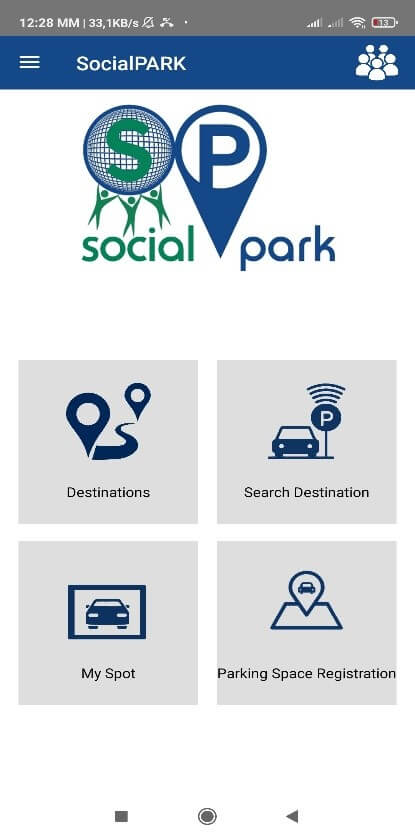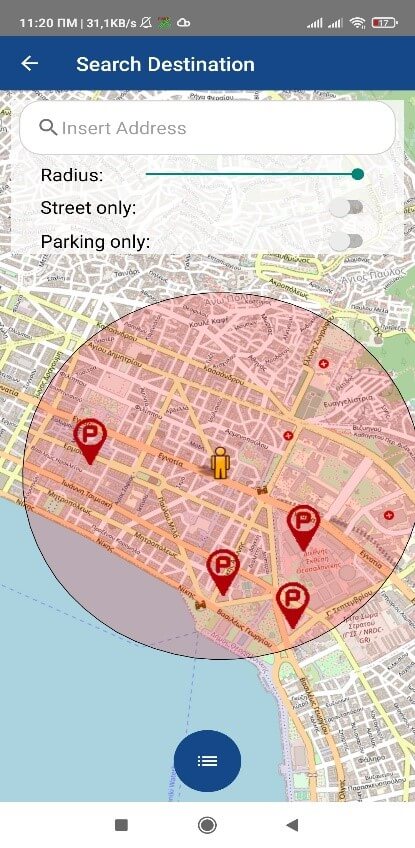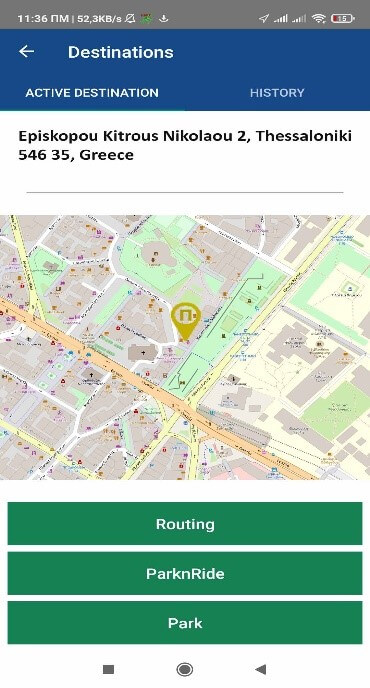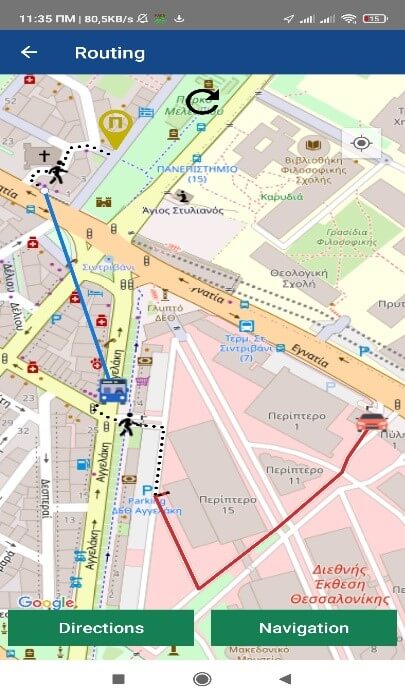SocialPARK: An Incentivizing Crowdsourced Parking Ecosystem
Written by Christos Zaroliagis
Limited information about parking space availability in urban environments is an everyday burden with a severe social and environmental impact, due to time loss and unnecessary pollution while looking for free parking spaces. Crowdsourcing has been used as a source of parking availability information, since it provides flexibility and a system based on it can be deployed at a large scale due to the low infrastructure cost. Mobile phone users, participating in such a crowdsourcing-based parking system, can provide the sought parking availability information and receive in return some reward. The major challenges in this context concern the utilization and the quality of the crowdsourced data.
Several crowdsourced-based systems have been developed towards addressing these challenges. For instance, in Google's OpenSpot [4] mobile users are asked to provide parking availability information, either when they release a parking space, or when they notice a free parking space on the street, and in return they receive a reputation reward. PrimoSpot [6] and SpotAngels [8] are two other parking applications in which users contribute to the creation of a database that contains data of city's parking spaces. Both applications hire people to take photos and give specific information of city's parking spaces. This information is stored in the database and hence the system provides parking rules and restrictions to the users. The users who have participated in data collection receive a small monetary reward.
Although incentives had already been introduced as a mechanism for encouraging high-quality user participation, there is still a need for complete, carefully designed incentivizing platforms for specific crowdsourcing-based parking services. Examples of such platforms include Trucentive [2], Parkbid [5] and the incentivization of vehicle relocation in Vehicle Sharing Systems [1]. Trucentive distributes a static amount of reward just when a user provides parking availability information, plus a dynamic amount of reward depending on the actual utilization by the system of this information. The drivers always must pay money as soon as they receive the parking availability information, regardless of whether they manage to park or not (a fact that seems risky – paying for a parking space that it is not guaranteed to be available, even if the user will be refunded). Parkbid's incentive-based system depends on many factors such as user's reputation and utility of the parking space. Every user who contributes parking availability information to the system is accompanied with a variable that indicates the user's reputation and his/her actions increase or decrease his/her reputation. The incentivization of vehicle relocation [1] provides two incentive-based schemes, to make users return their rented bike to a station that is best for the overall system (social optimum), rather than to the most convenient station for them.
Although Trucentive and ParkBid provide provably truthful and budget feasible rewarding schemes, they suffer from other issues. Trucentive does not prevent malicious users from performing consecutive misreports to aggregate points and does not cater for overaccumulation of points. In ParkBid, users are rewarded only when the reported parking space is eventually “bought” by another user. The non-rewarding (even by a small amount) of the provided parking availability information makes the system less attractive and may discourage users from reporting available parking spaces, especially when the probability of the reported parking space to be exploitable is low.
Developing therefore a crowdsourcing-based ecosystem for parking availability information entails the challenge of how to obtain high-quality and truthful information provided by (possibly) unreliable users. Ensuring trustworthiness of the provided information is a key aspect of any crowdsource-based parking ecosystem, since otherwise we may either end up with low-quality information, or with an incentive-based scheme that motivates users to give more and more (perhaps false) information just to aggregate (monetary) rewards.
 (a) |
 (b) |
 (c) |
 (d) |
Figure 1. The SocialPARK mobile application. (a) Initial screen; (b) Available parking spaces; (c) Some offered options; (d) Park and Ride.
To tackle this major challenge, a crowdsourced-based ecosystem called SocialPARK [7] has been recently developed that provides personalized parking functionalities as a service, auditing parking availability information through a crowdsourcing approach that gathers relevant information provided by end-users, parking vendors and municipalities. SocialPARK activates a community of interacting citizens, parking companies and municipalities, towards a mutually profitable management of the publicly available parking space.
SocialPARK offers unique features (see Figure 1) that contribute to the provision of personalized parking functionalities as a service (parking-as-a-service) to citizens and special groups, for:
- Discovering in real-time and reserving (whenever possible) free parking spaces, as well as navigate-to-park and park-and-ride services.
- Creating a closed system of collaborative management and availability of parking spaces belonging to a special group of citizens (e.g., disabled, elderly, etc.).
- Managing (either periodic, or spontaneous) queries for massive parking (e.g., for the cars of the employees of a company during weekdays, or for the cars of the spectators of a sports event).
- Creating a novel value-chain, based on parking services and “good-practice” rewarding schemes towards a more efficient management of the entire parking space, for the sake of the community.
- Providing parking brokerage services.
To engage and incentivize users in providing high-quality and truthful information, SocialPARK has developed two rewarding schemes [3] that provably incentivize users to behave truthfully. Both schemes use credits (points) as rewards for incentivizing users, who can then exchange them for discounts at the participating parking houses. The first scheme is based on a simple static approach, where users receive points for behaving truthfully, and which (points) are devaluated over time. The second scheme is based on a dynamic approach, in which users need to spend points for acquiring parking availability information by the ecosystem. Apart from being budget feasible and truthful, both schemes possess some novel features:
- The rewards are set in such a way so that every user is incentivized to voluntarily participate by providing truthful parking information.
- The point-systems are closed (the points spent by the users are returned to the system) and do not allow overaccumulation of points.
- The schemes prevent malicious users from misreporting to aggregate points and subsequently redeem them in the participating parking houses.
Acknowledgments
This work was supported by the Operational Program Competitiveness, Entrepreneurship, and Innovation (call Research-Create-Innovate), co-financed by EU and the Greek State under contract no. T1EDK-03616 (project SocialPARK).
References
- A. Angelopoulos, D. Gavalas, C. Konstantopoulos, D. Kypriadis, G. Pantziou. Incentivized Vehicle Relocation in Vehicle Sharing Systems. Transportation Research Part C, 97 (2018), pp. 175-193.
- B. Hoh, T. Yan, D. Ganesan, K. Tracton, T. Iwuchukwu, J. Lee. TruCentive: A Game-theoretic Incentive Platform for Trustworthy Mobile Crowdsourcing Parking Services. In IEEE Conference on Intelligent Transportation Systems, pp. 16-19, 2012.
- A. Kampyli, S. Kontogiannis, D. Kypriadis, and C. Zaroliagis. Incentivizing Truthfulness in Crowdsourced Parking Ecosystems. In IEEE International Smart Cities Conference - ISC2 2021, to appear.
- J. Kincaid. Google's Open Spot Makes Parking A Breeze, Assuming Everyone Turns into A Good Samaritan. https://techcrunch.com/2010/07/09/google-parking-open-spot/
- S. Noor, R. Hasan, A. Arora. ParkBid: An Incentive Based Crowdsourced Bidding Service for Parking Reservation. In IEEE Conference on Services Computing, 2017.
- PrimoSpot. http://www.citygoround.org/apps/primospot-parking/
- SocialPARK project. https://www.socialpark.upatras.gr/
- SpotAngels - Using crowds to solve the car parking problem. https://digital.hbs.edu/platform-digit/submission/spotangels-using-crowds-to-solve-the-car-parking-problem/
This article was edited by Sara Paiva
For a downloadable copy of the October 2021 eNewsletter which includes this article, please visit the IEEE Smart Cities Resource Center.

To have the eNewsletter delivered monthly to your inbox, join the IEEE Smart Cities Community.
Past Issues
To view archived articles, and issues, which deliver rich insight into the forces shaping the future of the smart cities. Older eNewsletter can be found here. To download full issues, visit the publications section of the IEEE Smart Cities Resource Center.



